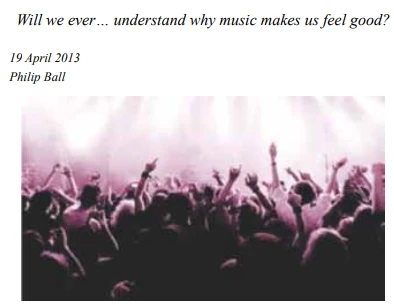Disciplina: Língua Portuguesa 0 Curtidas
O trecho final do quarto parágrafo – the payoff is all - UNIFESP 2014

No one knows why music has such a potent effect on our emotions. But thanks to some recent studies we have a few intriguing clues. Why do we like music? Like most good questions, this one works on many levels. We have answers on some levels, but not all.
We like music because it makes us feel good. Why does it make us feel good? In 2001, neuroscientists Anne Blood and Robert Zatorre at McGill University in Montreal provided an answer. Using magnetic resonance imaging they showed that people listening to pleasurable music had activated brain regions called the limbic and paralimbic areas, which are connected to euphoric reward responses, like those we experience from sex, good food and addictive drugs. Those rewards come from a gush of a neurotransmitter called dopamine. As DJ Lee Haslam told us, music is the drug. But why? It’s easy enough to understand why sex and food are rewarded with a dopamine rush: this makes us want more, and so contributes to our survival and propagation. (Some drugs subvert that survival instinct by stimulating dopamine release on false pretences.) But why would a sequence of sounds with no obvious survival value do the same thing?
The truth is no one knows. However, we now have many clues to why music provokes intense emotions. The current favourite theory among scientists who study the cognition of music – how we process it mentally – dates back to 1956, when the philosopher and composer Leonard Meyer suggested that emotion in music is all about what we expect, and whether or not we get it. Meyer drew on earlier psychological theories of emotion, which proposed that it arises when we’re unable to satisfy some desire. That, as you might imagine, creates frustration or anger – but if we then find what we’re looking for, be it love or a cigarette, the payoff is all the sweeter.
This, Meyer argued, is what music does too. It sets up sonic patterns and regularities that tempt us to make unconscious predictions about what’s coming next. If we’re right, the brain gives itself a little reward – as we’d now see it, a surge of dopamine. The constant dance between expectation and outcome thus enlivens the brain with a pleasurable play of emotions.
(www.bbc.com. Adaptado.)
O trecho final do quarto parágrafo – the payoff is all the sweeter – pode ser corretamente entendido como:
-
a retribuição dá muito prazer.
-
a moderação vale a pena.
-
a compensação foi menor que a esperada.
-
a sensação de alívio é relaxante.
-
a frustração é substituída pelo amor.
Solução
Alternativa Correta: A) a retribuição dá muito prazer.
A alternativa correta é A) a retribuição dá muito prazer porque, no contexto do quarto parágrafo, o termo the payoff is all the sweeter refere-se ao prazer intenso ou à recompensa ainda maior que ocorre quando uma expectativa, inicialmente frustrante, é finalmente satisfeita. No trecho, o autor está explicando como a música provoca emoções intensas quando a expectativa do ouvinte se alinha com o que ocorre na música, o que resulta em uma sensação de prazer, uma "recompensa" mental.
Essa expressão é usada para ilustrar a ideia de que, quando buscamos algo, como o amor ou um cigarro, e finalmente o encontramos, a sensação de recompensa é ainda mais prazerosa. A palavra "sweeter" (mais doce) sugere um aumento na intensidade do prazer ao se alcançar o objetivo desejado, o que está diretamente relacionado ao conceito de recompensa emocional.
As outras alternativas não correspondem ao significado da expressão "the payoff is all the sweeter". Por exemplo, a moderação vale a pena e a frustração é substituída pelo amor não refletem corretamente a ideia de uma recompensa mais prazerosa após a satisfação de uma expectativa. Portanto, a alternativa correta é A), pois descreve de forma precisa a recompensa prazerosa mencionada no texto.
Institução: UNIFESP
Ano da Prova: 2014
Assuntos: Interpretação Textual em Inglês
Vídeo Sugerido: YouTube